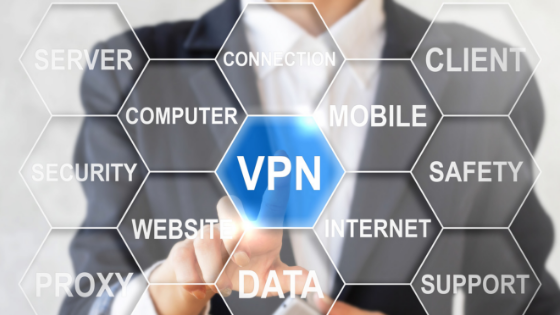When you work from a home office, you don’t have the same built-in online security protection that is provided in a traditional office environment. Making sure your online activity is secure is up to you. Maybe you think your home connection is perfectly safe. But how truly secure is your Internet access? The reality is that a typical home Internet connection is not secure at all. Virtual security in you home office is as important as physical home office security for the teleworker.
I’m sure the following scenario sounds familiar. You surfed from your home office computer to an innocuous website like, say, one of those big-box home improvement stores to find, say, a “lawn mower spark plug.” What happens next? Every browser-based application or smartphone app you open spews ads for spark plugs and lawnmowers and lawn mowing services and lawn seeds and on-and-on! How does that happen?! How does a simple browser search permeate your subsequent online activity? More importantly, how can you avoid this to begin with?
Well, this happens because all your online traffic is traveling unsecured across the Internet, available to be read by nearly anyone. And, your IP address and your search criteria are grabbed by the search engine provider and your Internet Service Provider (ISP) and sold to third parties interested in providing you with mower parts and service…actually, all things related to your browsing activity!
VPN to the Rescue
How can you keep everyone from watching your online activity? Use a Virtual Private Network (VPN) connection on your home office computer! A VPN lets you access the web privately and securely.
How Do I Get VPN?
First, find a VPN Service provider. What’s the quickest way? Go online with your unsecured connection and do a search on “VPN Services!” You will be inundated by more ads for and reviews of VPN services than you can imagine. But really, do some research and find a reputable provider. The cost can be as little as $2.99 per month for a single device with a multi-year plan. I’ll give you some features to look for in a moment.
How does VPN work?
Once you have selected a VPN service, you must install their client-side application on your device. This app encrypts your data before it leaves your computer and long before it arrives at your ISP. So, as you perform your normal daily online activities on your computer, all your online activity is first routed through a VPN server at the VPN service. Your client-side app uses encryption that only their VPN server can decipher. This works from home or on a wide-open WiFi connection at your favorite local lunch spot. The advantage here is that the VPN server connects to the web on your behalf. From the web’s perspective, your IP address is that of the VPN server! Your search criteria and all your traffic simply looks like it is being requested and sent to the VPN server box. And, even if your local ISP monitors your online activity specifically before it reaches the VPN server, all they see is encrypted data.
Techie Stuff: The Best VPN Protocol and Encryption Algorithm
Several communication protocols have been developed over the years to provide the secure connection. If your selected provider offers OpenVPN and it is compatible with your device, go with that. Also, the encryption algorithm that your service uses is the second half of the secure connection formula. Make sure your data are being encrypted using the AES (Advanced Encryption Standards) Algorithm of at least 128 bits. Some providers use AES with 256-bit encryption, which is even better. The package you sign up for will clearly state the encryption algorithm used. Pick a provider with these two features and you will be set.
There Are No Rules Now?
So, you have found a VPN provider with top-notch protocols and algorithms at a reasonable price. You’ve set it up on your device and now you are fully anonymous to the world as you browse around the Internet. But, be forewarned! VPN services often keep various logs…devices used, payment logs, IP addresses, connectivity timestamps…for their own protection. Therefore, some lingering information that may be linkable to your device might exist tucked away on a VPN server. While we all want our privacy and don’t want to be inundated with ads, keep your activity on the up and up.
You Get What You Pay For
The average price for a VPN connection for one device from a reputable VPN provider is about $5 per month for an annual subscription. Providing this valuable service is not cheap…requiring rooms full of servers and connectivity-managing devices. If you see an offer for free VPN, just remember that they need to pay for their equipment and connections somehow…maybe by selling your account activity to third parties or severely cutting corners on data security. So, do yourself a favor and pay the very reasonable monthly fee. For the protection it provides, it would be a bargain at twice the price!
Don’t Forget Your Mobile Devices
Does VPN technology work for mobile devices? You bet! But, again, be careful. On your iPhone, go to Settings | General | VPN and configure your phone to your VPN provider. Currently, the best VPN Protocol for IOS is IKEv2 (Internet Key Exchange, Version 2). Free VPN for your smartphone will almost certainly include malware, or not be truly secure, or track your activity. Again, pay for a reputable service.
The Bottom Line
An affordable way to keep Big Brother and nosy neighbors in the dark about your Internet activity exists in the form of a Virtual Private Network service. You will quickly notice the creepiness of the pop-up ads subside and you may just thwart a bad guy from getting your sensitive business – or your banking account – information!




.jpg)

.png)
.png)
/Employee%20Autonomy%20Part%202%20(Blog%20Title).png)
.jpg)


.jpg)
.jpg)
.jpg)
.jpg)
.jpg)
.jpg)
-1.jpg)
.jpg)

